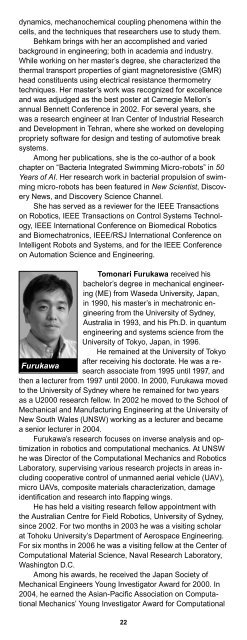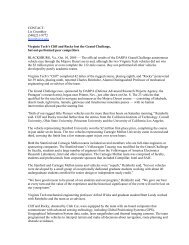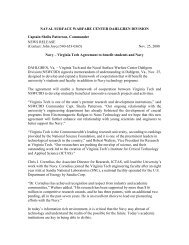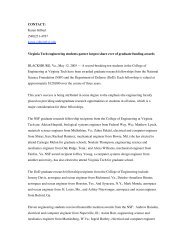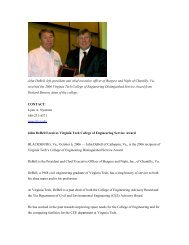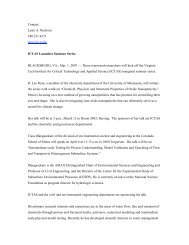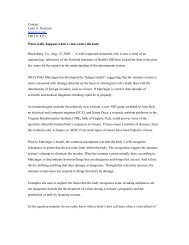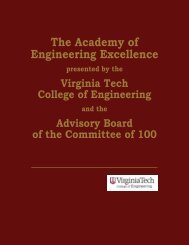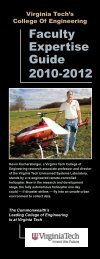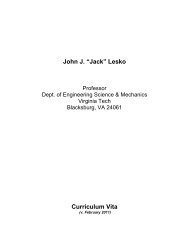New Faculty Virginia Tech's College of Engineering 2008-2009
New Faculty Virginia Tech's College of Engineering 2008-2009
New Faculty Virginia Tech's College of Engineering 2008-2009
Create successful ePaper yourself
Turn your PDF publications into a flip-book with our unique Google optimized e-Paper software.
dynamics, mechanochemical coupling phenomena within the<br />
cells, and the techniques that researchers use to study them.<br />
Behkam brings with her an accomplished and varied<br />
background in engineering; both in academia and industry.<br />
While working on her master’s degree, she characterized the<br />
thermal transport properties <strong>of</strong> giant magnetoresistive (GMR)<br />
head constituents using electrical resistance thermometry<br />
techniques. Her master’s work was recognized for excellence<br />
and was adjudged as the best poster at Carnegie Mellon’s<br />
annual Bennett Conference in 2002. For several years, she<br />
was a research engineer at Iran Center <strong>of</strong> Industrial Research<br />
and Development in Tehran, where she worked on developing<br />
propriety s<strong>of</strong>tware for design and testing <strong>of</strong> automotive break<br />
systems.<br />
Among her publications, she is the co-author <strong>of</strong> a book<br />
chapter on “Bacteria Integrated Swimming Micro-robots” in 50<br />
Years <strong>of</strong> AI. Her research work in bacterial propulsion <strong>of</strong> swimming<br />
micro-robots has been featured in <strong>New</strong> Scientist, Discovery<br />
<strong>New</strong>s, and Discovery Science Channel.<br />
She has served as a reviewer for the IEEE Transactions<br />
on Robotics, IEEE Transactions on Control Systems Technology,<br />
IEEE International Conference on Biomedical Robotics<br />
and Biomechatronics, IEEE/RSJ International Conference on<br />
Intelligent Robots and Systems, and for the IEEE Conference<br />
on Automation Science and <strong>Engineering</strong>.<br />
Tomonari Furukawa received his<br />
bachelor’s degree in mechanical engineering<br />
(ME) from Waseda University, Japan,<br />
in 1990, his master’s in mechatronic engineering<br />
from the University <strong>of</strong> Sydney,<br />
Australia in 1993, and his Ph.D. in quantum<br />
engineering and systems science from the<br />
University <strong>of</strong> Tokyo, Japan, in 1996.<br />
He remained at the University <strong>of</strong> Tokyo<br />
after receiving his doctorate. He was a research<br />
associate from 1995 until 1997, and<br />
Furukawa<br />
then a lecturer from 1997 until 2000. In 2000, Furukawa moved<br />
to the University <strong>of</strong> Sydney where he remained for two years<br />
as a U2000 research fellow. In 2002 he moved to the School <strong>of</strong><br />
Mechanical and Manufacturing <strong>Engineering</strong> at the University <strong>of</strong><br />
<strong>New</strong> South Wales (UNSW) working as a lecturer and became<br />
a senior lecturer in 2004.<br />
Furukawa’s research focuses on inverse analysis and optimization<br />
in robotics and computational mechanics. At UNSW<br />
he was Director <strong>of</strong> the Computational Mechanics and Robotics<br />
Laboratory, supervising various research projects in areas including<br />
cooperative control <strong>of</strong> unmanned aerial vehicle (UAV),<br />
micro UAVs, composite materials characterization, damage<br />
identification and research into flapping wings.<br />
He has held a visiting research fellow appointment with<br />
the Australian Centre for Field Robotics, University <strong>of</strong> Sydney,<br />
since 2002. For two months in 2003 he was a visiting scholar<br />
at Tohoku University’s Department <strong>of</strong> Aerospace <strong>Engineering</strong>.<br />
For six months in 2006 he was a visiting fellow at the Center <strong>of</strong><br />
Computational Material Science, Naval Research Laboratory,<br />
Washington D.C.<br />
Among his awards, he received the Japan Society <strong>of</strong><br />
Mechanical Engineers Young Investigator Award for 2000. In<br />
2004, he earned the Asian-Pacific Association on Computational<br />
Mechanics’ Young Investigator Award for Computational<br />
22


